- Home
- H. Rider Haggard
King Solomon's Mines Page 6
King Solomon's Mines Read online
Page 6
CHAPTER IV
AN ELEPHANT HUNT
Now I do not propose to narrate at full length all the incidents of ourlong travel up to Sitanda's Kraal, near the junction of the Lukanga andKalukwe Rivers. It was a journey of more than a thousand miles fromDurban, the last three hundred or so of which we had to make on foot,owing to the frequent presence of the dreadful "tsetse" fly, whose biteis fatal to all animals except donkeys and men.
We left Durban at the end of January, and it was in the second week ofMay that we camped near Sitanda's Kraal. Our adventures on the way weremany and various, but as they are of the sort which befall everyAfrican hunter--with one exception to be presently detailed--I shallnot set them down here, lest I should render this history too wearisome.
At Inyati, the outlying trading station in the Matabele country, ofwhich Lobengula (a great and cruel scoundrel) is king, with manyregrets we parted from our comfortable wagon. Only twelve oxen remainedto us out of the beautiful span of twenty which I had bought at Durban.One we lost from the bite of a cobra, three had perished from "poverty"and the want of water, one strayed, and the other three died fromeating the poisonous herb called "tulip." Five more sickened from thiscause, but we managed to cure them with doses of an infusion made byboiling down the tulip leaves. If administered in time this is a veryeffective antidote.
The wagon and the oxen we left in the immediate charge of Goza and Tom,our driver and leader, both trustworthy boys, requesting a worthyScotch missionary who lived in this distant place to keep an eye onthem. Then, accompanied by Umbopa, Khiva, Ventvoegel, and half a dozenbearers whom we hired on the spot, we started off on foot upon our wildquest. I remember we were all a little silent on the occasion of thisdeparture, and I think that each of us was wondering if we should eversee our wagon again; for my part I never expected to do so. For a whilewe tramped on in silence, till Umbopa, who was marching in front, brokeinto a Zulu chant about how some brave men, tired of life and thetameness of things, started off into a vast wilderness to find newthings or die, and how, lo and behold! when they had travelled far intothe wilderness they found that it was not a wilderness at all, but abeautiful place full of young wives and fat cattle, of game to hunt andenemies to kill.
Then we all laughed and took it for a good omen. Umbopa was a cheerfulsavage, in a dignified sort of way, when he was not suffering from oneof his fits of brooding, and he had a wonderful knack of keeping up ourspirits. We all grew very fond of him.
And now for the one adventure to which I am going to treat myself, forI do dearly love a hunting yarn.
About a fortnight's march from Inyati we came across a peculiarlybeautiful bit of well-watered woodland country. The kloofs in the hillswere covered with dense bush, "idoro" bush as the natives call it, andin some places, with the "wacht-een-beche," or "wait-a-little thorn,"and there were great quantities of the lovely "machabell" tree, ladenwith refreshing yellow fruit having enormous stones. This tree is theelephant's favourite food, and there were not wanting signs that thegreat brutes had been about, for not only was their spoor frequent, butin many places the trees were broken down and even uprooted. Theelephant is a destructive feeder.
One evening, after a long day's march, we came to a spot of greatloveliness. At the foot of a bush-clad hill lay a dry river-bed, inwhich, however, were to be found pools of crystal water all troddenround with the hoof-prints of game. Facing this hill was a park-likeplain, where grew clumps of flat-topped mimosa, varied with occasionalglossy-leaved machabells, and all round stretched the sea of pathless,silent bush.
As we emerged into this river-bed path suddenly we started a troop oftall giraffes, who galloped, or rather sailed off, in their strangegait, their tails screwed up over their backs, and their hoofs rattlinglike castanets. They were about three hundred yards from us, andtherefore practically out of shot, but Good, who was walking ahead, andwho had an express loaded with solid ball in his hand, could not resisttemptation. Lifting his gun, he let drive at the last, a young cow. Bysome extraordinary chance the ball struck it full on the back of theneck, shattering the spinal column, and that giraffe went rolling headover heels just like a rabbit. I never saw a more curious thing.
"Curse it!" said Good--for I am sorry to say he had a habit of usingstrong language when excited--contracted, no doubt, in the course ofhis nautical career; "curse it! I've killed him."
"_Ou_, Bougwan," ejaculated the Kafirs; "_ou! ou!_"
They called Good "Bougwan," or Glass Eye, because of his eye-glass.
"Oh, 'Bougwan!'" re-echoed Sir Henry and I, and from that day Good'sreputation as a marvellous shot was established, at any rate among theKafirs. Really he was a bad one, but whenever he missed we overlookedit for the sake of that giraffe.
Having set some of the "boys" to cut off the best of the giraffe'smeat, we went to work to build a "scherm" near one of the pools andabout a hundred yards to its right. This is done by cutting a quantityof thorn bushes and piling them in the shape of a circular hedge. Thenthe space enclosed is smoothed, and dry tambouki grass, if obtainable,is made into a bed in the centre, and a fire or fires lighted.
By the time the "scherm" was finished the moon peeped up, and ourdinners of giraffe steaks and roasted marrow-bones were ready. How weenjoyed those marrow-bones, though it was rather a job to crack them! Iknow of no greater luxury than giraffe marrow, unless it is elephant'sheart, and we had that on the morrow. We ate our simple meal by thelight of the moon, pausing at times to thank Good for his wonderfulshot; then we began to smoke and yarn, and a curious picture we musthave made squatting there round the fire. I, with my short grizzledhair sticking up straight, and Sir Henry with his yellow locks, whichwere getting rather long, were rather a contrast, especially as I amthin, and short, and dark, weighing only nine stone and a half, and SirHenry is tall, and broad, and fair, and weighs fifteen. But perhaps themost curious-looking of the three, taking all the circumstances of thecase into consideration, was Captain John Good, R.N. There he sat upona leather bag, looking just as though he had come in from a comfortableday's shooting in a civilised country, absolutely clean, tidy, and welldressed. He wore a shooting suit of brown tweed, with a hat to match,and neat gaiters. As usual, he was beautifully shaved, his eye-glassand his false teeth appeared to be in perfect order, and altogether helooked the neatest man I ever had to do with in the wilderness. He evensported a collar, of which he had a supply, made of white gutta-percha.
"You see, they weigh so little," he said to me innocently, when Iexpressed my astonishment at the fact; "and I always like to turn outlike a gentleman." Ah! if he could have foreseen the future and theraiment prepared for him.
Well, there we three sat yarning away in the beautiful moonlight, andwatching the Kafirs a few yards off sucking their intoxicating "daccha"from a pipe of which the mouthpiece was made of the horn of an eland,till one by one they rolled themselves up in their blankets and went tosleep by the fire, that is, all except Umbopa, who was a little apart,his chin resting on his hand, and thinking deeply. I noticed that henever mixed much with the other Kafirs.
Presently, from the depths of the bush behind us, came a loud "_woof_,_woof_!" "That's a lion," said I, and we all started up to listen.Hardly had we done so, when from the pool, about a hundred yards off,we heard the strident trumpeting of an elephant. "_Unkungunklovo_!_Indlovu_!" "Elephant! Elephant!" whispered the Kafirs, and a fewminutes afterwards we saw a succession of vast shadowy forms movingslowly from the direction of the water towards the bush.
Up jumped Good, burning for slaughter, and thinking, perhaps, that itwas as easy to kill elephant as he had found it to shoot giraffe, but Icaught him by the arm and pulled him down.
"It's no good," I whispered, "let them go."
"It seems that we are in a paradise of game. I vote we stop here a dayor two, and have a go at them," said Sir Henry, presently.
I was rather surprised, for hitherto Sir Henry had always been forpushing forward as fast as possible, more especially since weascertain
ed at Inyati that about two years ago an Englishman of thename of Neville _had_ sold his wagon there, and gone on up country. ButI suppose his hunter instincts got the better of him for a while.
Good jumped at the idea, for he was longing to have a shot at thoseelephants; and so, to speak the truth, did I, for it went against myconscience to let such a herd as that escape without a pull at them.
"All right, my hearties," said I. "I think we want a little recreation.And now let's turn in, for we ought to be off by dawn, and then perhapswe may catch them feeding before they move on."
The others agreed, and we proceeded to make our preparations. Good tookoff his clothes, shook them, put his eye-glass and his false teeth intohis trousers pocket, and folding each article neatly, placed it out ofthe dew under a corner of his mackintosh sheet. Sir Henry and Icontented ourselves with rougher arrangements, and soon were curled upin our blankets, and dropping off into the dreamless sleep that rewardsthe traveller.
Going, going, go--What was that?
Suddenly, from the direction of the water came sounds of violentscuffling, and next instant there broke upon our ears a succession ofthe most awful roars. There was no mistaking their origin; only a lioncould make such a noise as that. We all jumped up and looked towardsthe water, in the direction of which we saw a confused mass, yellow andblack in colour, staggering and struggling towards us. We seized ourrifles, and slipping on our veldtschoons, that is shoes made ofuntanned hide, ran out of the scherm. By this time the mass had fallen,and was rolling over and over on the ground, and when we reached thespot it struggled no longer, but lay quite still.
Now we saw what it was. On the grass there lay a sable antelopebull--the most beautiful of all the African antelopes--quite dead, andtransfixed by its great curved horns was a magnificent black-manedlion, also dead. Evidently what had happened was this: The sableantelope had come down to drink at the pool where the lion--no doubtthe same which we had heard--was lying in wait. While the antelopedrank, the lion had sprung upon him, only to be received upon the sharpcurved horns and transfixed. Once before I saw a similar thing happen.Then the lion, unable to free himself, had torn and bitten at the backand neck of the bull, which, maddened with fear and pain, had rushed onuntil it dropped dead.
As soon as we had examined the beasts sufficiently we called theKafirs, and between us managed to drag their carcases up to the scherm.After that we went in and lay down, to wake no more till dawn.
With the first light we were up and making ready for the fray. We tookwith us the three eight-bore rifles, a good supply of ammunition, andour large water-bottles, filled with weak cold tea, which I have alwaysfound the best stuff to shoot on. After swallowing a little breakfastwe started, Umbopa, Khiva, and Ventvoegel accompanying us. The otherKafirs we left with instructions to skin the lion and the sableantelope, and to cut up the latter.
We had no difficulty in finding the broad elephant trail, whichVentvoegel, after examination, pronounced to have been made by betweentwenty and thirty elephants, most of them full-grown bulls. But theherd had moved on some way during the night, and it was nine o'clock,and already very hot, before, by the broken trees, bruised leaves andbark, and smoking droppings, we knew that we could not be far from them.
Presently we caught sight of the herd, which numbered, as Ventvoegel hadsaid, between twenty and thirty, standing in a hollow, having finishedtheir morning meal, and flapping their great ears. It was a splendidsight, for they were only about two hundred yards from us. Taking ahandful of dry grass, I threw it into the air to see how the wind was;for if once they winded us I knew they would be off before we could geta shot. Finding that, if anything, it blew from the elephants to us, wecrept on stealthily, and thanks to the cover managed to get withinforty yards or so of the great brutes. Just in front of us, andbroadside on, stood three splendid bulls, one of them with enormoustusks. I whispered to the others that I would take the middle one; SirHenry covering the elephant to the left, and Good the bull with the bigtusks.
"Now," I whispered.
Boom! boom! boom! went the three heavy rifles, and down came SirHenry's elephant dead as a hammer, shot right through the heart. Minefell on to its knees and I thought that he was going to die, but inanother moment he was up and off, tearing along straight past me. As hewent I gave him the second barrel in the ribs, and this brought himdown in good earnest. Hastily slipping in two fresh cartridges I ranclose up to him, and a ball through the brain put an end to the poorbrute's struggles. Then I turned to see how Good had fared with the bigbull, which I had heard screaming with rage and pain as I gave mine itsquietus. On reaching the captain I found him in a great state ofexcitement. It appeared that on receiving the bullet the bull hadturned and come straight for his assailant, who had barely time to getout of his way, and then charged on blindly past him, in the directionof our encampment. Meanwhile the herd had crashed off in wild alarm inthe other direction.
For awhile we debated whether to go after the wounded bull or to followthe herd, and finally deciding for the latter alternative, departed,thinking that we had seen the last of those big tusks. I have oftenwished since that we had. It was easy work to follow the elephants, forthey had left a trail like a carriage road behind them, crushing downthe thick bush in their furious flight as though it were tambouki grass.
But to come up with them was another matter, and we had struggled onunder the broiling sun for over two hours before we found them. Withthe exception of one bull, they were standing together, and I couldsee, from their unquiet way and the manner in which they kept liftingtheir trunks to test the air, that they were on the look-out formischief. The solitary bull stood fifty yards or so to this side of theherd, over which he was evidently keeping sentry, and about sixty yardsfrom us. Thinking that he would see or wind us, and that it wouldprobably start them off again if we tried to get nearer, especially asthe ground was rather open, we all aimed at this bull, and at mywhispered word, we fired. The three shots took effect, and down he wentdead. Again the herd started, but unfortunately for them about ahundred yards further on was a nullah, or dried-out water track, withsteep banks, a place very much resembling the one where the PrinceImperial was killed in Zululand. Into this the elephants plunged, andwhen we reached the edge we found them struggling in wild confusion toget up the other bank, filling the air with their screams, andtrumpeting as they pushed one another aside in their selfish panic,just like so many human beings. Now was our opportunity, and firingaway as quickly as we could load, we killed five of the poor beasts,and no doubt should have bagged the whole herd, had they not suddenlygiven up their attempts to climb the bank and rushed headlong down thenullah. We were too tired to follow them, and perhaps also a littlesick of slaughter, eight elephants being a pretty good bag for one day.
So after we were rested a little, and the Kafirs had cut out the heartsof two of the dead elephants for supper, we started homewards, verywell pleased with our day's work, having made up our minds to send thebearers on the morrow to chop away the tusks.
Shortly after we re-passed the spot where Good had wounded thepatriarchal bull we came across a herd of eland, but did not shoot atthem, as we had plenty of meat. They trotted past us, and then stoppedbehind a little patch of bush about a hundred yards away, wheelinground to look at us. As Good was anxious to get a near view of them,never having seen an eland close, he handed his rifle to Umbopa, and,followed by Khiva, strolled up to the patch of bush. We sat down andwaited for him, not sorry of the excuse for a little rest.
The sun was just going down in its reddest glory, and Sir Henry and Iwere admiring the lovely scene, when suddenly we heard an elephantscream, and saw its huge and rushing form with uplifted trunk and tailsilhouetted against the great fiery globe of the sun. Next second wesaw something else, and that was Good and Khiva tearing back towards uswith the wounded bull--for it was he--charging after them. For a momentwe did not dare to fire--though at that distance it would have been oflittle use if we had done so--for fear of hitting one of th
em, and thenext a dreadful thing happened--Good fell a victim to his passion forcivilised dress. Had he consented to discard his trousers and gaiterslike the rest of us, and to hunt in a flannel shirt and a pair ofveldt-schoons, it would have been all right. But as it was, histrousers cumbered him in that desperate race, and presently, when hewas about sixty yards from us, his boot, polished by the dry grass,slipped, and down he went on his face right in front of the elephant.
We gave a gasp, for we knew that he must die, and ran as hard as wecould towards him. In three seconds it had ended, but not as wethought. Khiva, the Zulu boy, saw his master fall, and brave lad as hewas, turned and flung his assegai straight into the elephant's face. Itstuck in his trunk.
With a scream of pain, the brute seized the poor Zulu, hurled him tothe earth, and placing one huge foot on to his body about the middle,twined its trunk round his upper part and _tore him in two_.
We rushed up mad with horror, and fired again and again, till presentlythe elephant fell upon the fragments of the Zulu.
As for Good, he rose and wrung his hands over the brave man who hadgiven his life to save him, and, though I am an old hand, I felt a lumpgrow in my throat. Umbopa stood contemplating the huge dead elephantand the mangled remains of poor Khiva.
"Ah, well," he said presently, "he is dead, but he died like a man!"

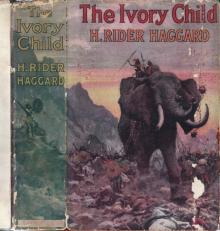 The Ivory Child
The Ivory Child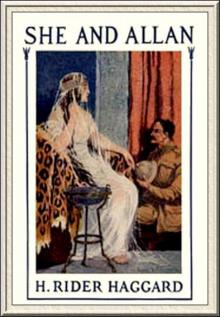 She and Allan
She and Allan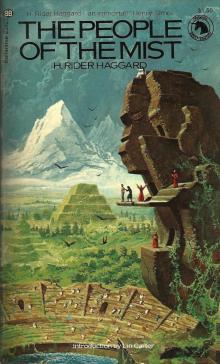 The People of the Mist
The People of the Mist She
She Morning Star
Morning Star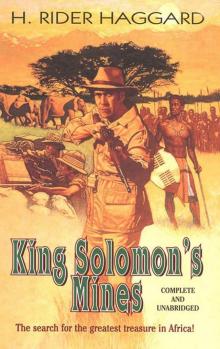 King Solomon's Mines
King Solomon's Mines She: A History of Adventure
She: A History of Adventure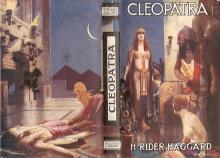 Cleopatra
Cleopatra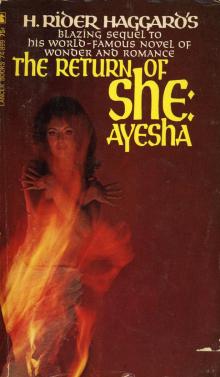 Ayesha, the Return of She
Ayesha, the Return of She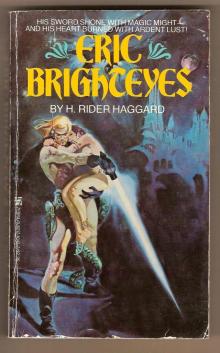 Eric Brighteyes
Eric Brighteyes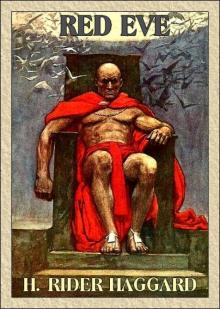 Red Eve
Red Eve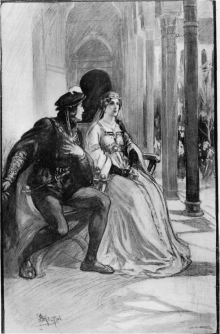 Fair Margaret
Fair Margaret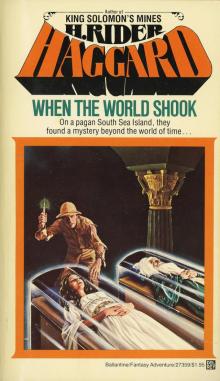 When the World Shook
When the World Shook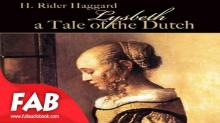 Lysbeth, a Tale of the Dutch
Lysbeth, a Tale of the Dutch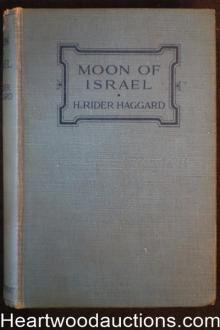 Moon of Israel: A Tale of the Exodus
Moon of Israel: A Tale of the Exodus Long Odds
Long Odds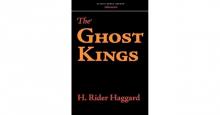 The Ghost Kings
The Ghost Kings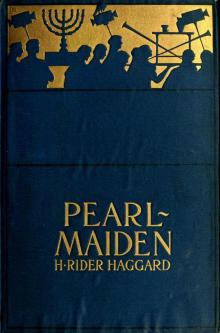 Pearl-Maiden: A Tale of the Fall of Jerusalem
Pearl-Maiden: A Tale of the Fall of Jerusalem Allan and the Holy Flower
Allan and the Holy Flower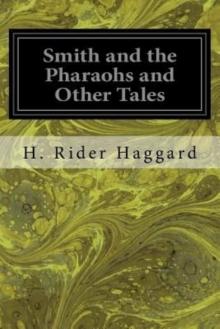 Smith and the Pharaohs, and other Tales
Smith and the Pharaohs, and other Tales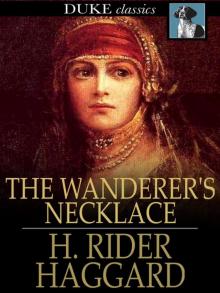 The Wanderer's Necklace
The Wanderer's Necklace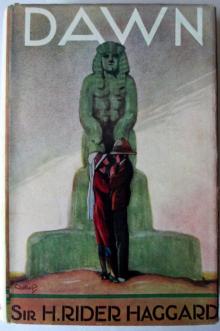 Dawn
Dawn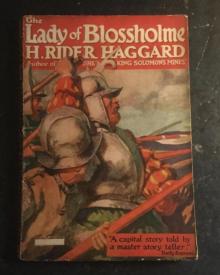 The Lady of Blossholme
The Lady of Blossholme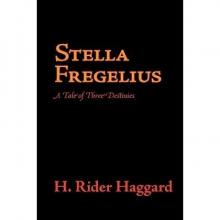 Stella Fregelius: A Tale of Three Destinies
Stella Fregelius: A Tale of Three Destinies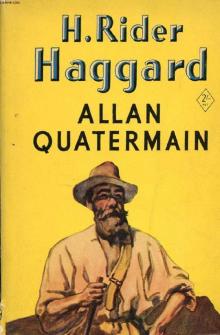 Allan Quatermain
Allan Quatermain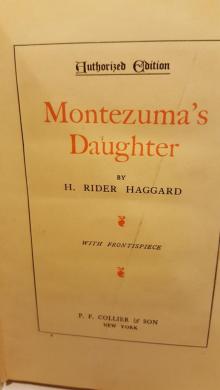 Montezuma's Daughter
Montezuma's Daughter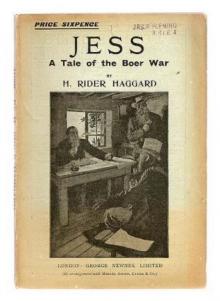 Jess
Jess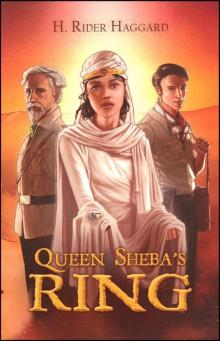 The Brethren
The Brethren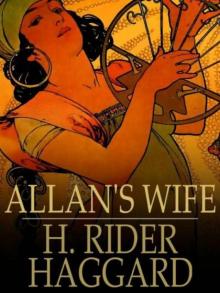 Allan's Wife
Allan's Wife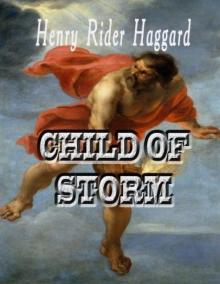 Child of Storm
Child of Storm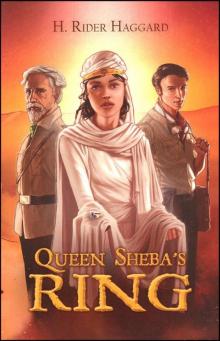 Queen Sheba's Ring
Queen Sheba's Ring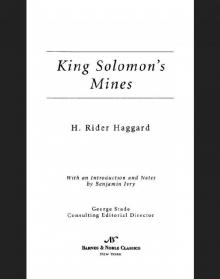 King Solomon's Mines (Barnes & Noble Classics Series)
King Solomon's Mines (Barnes & Noble Classics Series)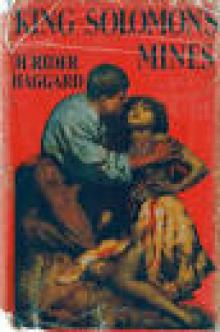 Complete Allan Quatermain Omnibus - Volumes 1 - 10
Complete Allan Quatermain Omnibus - Volumes 1 - 10